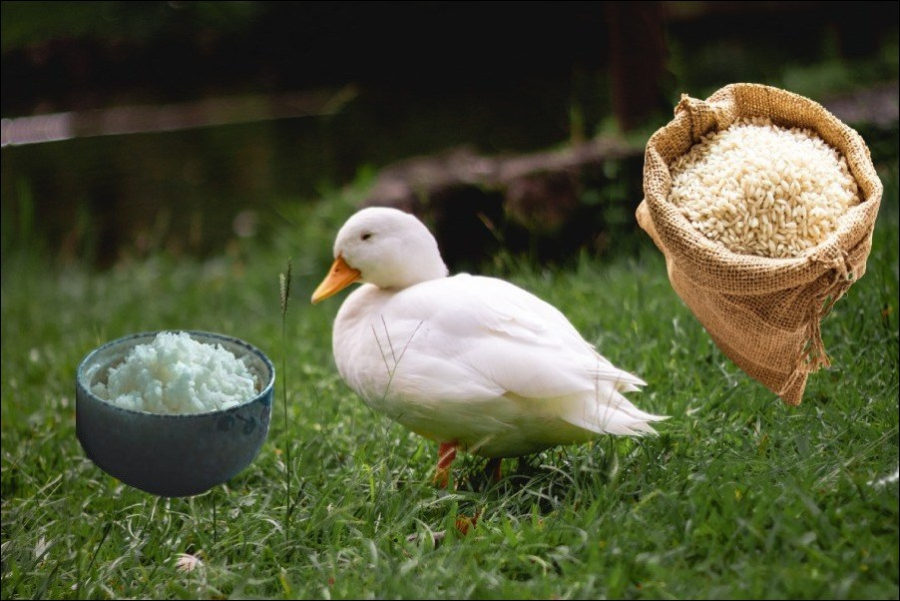
Rice has been around for over 12 000 years and ducks for over 25 million years. Ducks and rice share a long history and crossed many roads. Rice is actually a staple food for half the world’s population, and people depend on rice for more than 20% of their daily calories.
Ducks can eat rice, and it is good for them. Ducks love the taste of rice and its health benefits. Ducks can eat basmati-, brown-, jasmine-, sushi- or any other type of rice—both uncooked and cooked. However, they can’t eat moldy or rotten rice since it’s toxic to them.
Rice contains Calcium, Folate, Iron, Magnesium, Phosphorus, Potassium, Vitamin B6, and Zinc which all fit perfectly in a duck’s diet. There are multiple health benefits from feeding rice to your duck.
Can ducks eat rice?
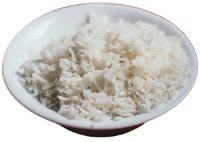
Ducks can, without a doubt, eat rice. Ducks not only can eat rice – they love it.
Rice provides ducks with many important vitamins and minerals, which are essential for the duck’s wellbeing. Not only does rice contain a lot of nutrients, but it also comes packed with protein and fiber.
I would recommend you clean the rice before offering it to the ducks. Raw rice is coated with chemicals, bugs, dirt, and starch. The starch makes the rice clump up and bind fluids. It doesn’t have to be too advanced cleaning, but rinsing it a few times would benefit the digestion process.
Can ducklings eat rice?
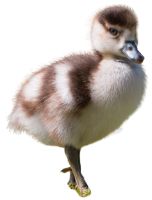
Ducklings can eat rice. However, the ducklings mustn’t be getting as much food as the adult ducks. Ducklings require a higher amount of protein (22%) in their early days and then decrease the amount of protein later on as it grows up. There is a good feed for ducklings that provide 22% of the protein at the beginning of their life. Later on, you can incorporate other foods, like rice.
Do ducks like to eat rice?
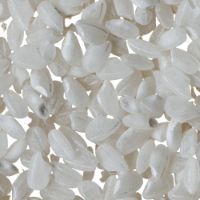
Ducks like to eat rice, both cooked and uncooked. Rice is easy for them to swallow and doesn’t require much effort from them. They also seem to like sushi as long as the pieces aren’t too big and fit in their mouth.
Ducks are omnivores and can eat a lot of foods. Vegetables provide ducks with a great amount of nutrients and keeping them happy. There are some vegetables that are better for ducks than others. Some may even be harmful to them. Check out what vegetables you can and can not feed ducks here.
Is rice good for ducks?
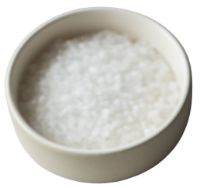
Rice is both packed with minerals and vitamins. Minerals in rice are phosphorus, potassium, and zinc. Vitamins are Thiamin, Riboflavin, Niacin, Vitamin B6, and Folate. However, rice does come with a lot of calories. 100 grams of uncooked rice contains over 350 calories which are quite high for just one duck to eat beyond their regular diet. Rice is good for ducks but needs to be served in moderation.
Can ducks eat basmati rice?
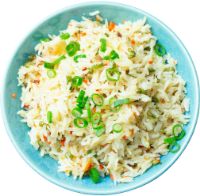
If you plan to buy rice to feed your ducks, basmati rice is the one you should pick. Unlike jasmine rice, basmati rice doesn’t stick as easily. It would be best if you cleaned the basmati rice before serving it to the ducks. Uncooked rice has chemicals, bugs, and a lot of starch attached to the grains. Try to rinse and clean it as much as possible before serving. If you are using a pot, try to make the water as clear as possible. It might take 3 or 4 times until done.
Can ducks eat jasmine rice?
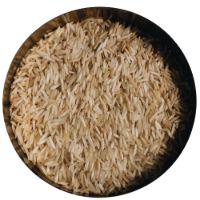
Jasmine rice is fine to feed ducks as long as it is in moderation and cleaned. Jasmine rice is more important to clean and rinse before serving it to ducks. Jasmine rice has more starch and thus making it more sticky than basmati rice. The starch binds easier to water, making lumps and can make it harder to digest.
Beyond rice, ducks also like to eat fruit. There are some fruits you shouldn’t feed ducks. Find out what fruits you can feed ducks and which to avoid.
Can ducks eat sushi?
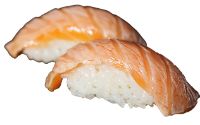
Ducks can eat sushi. At least almost all toppings. There are some toppings you never should feed your duck. I wrote a complete resource going through the most popular Nigiri sushi and checked if ducks can or can’t eat them. You might want to check that out to learn which you should avoid.
Did you know ducks can eat many different human foods? I made a list containing over 85 examples of human foods and if ducks can or can not eat them. You may be surprised over the results.
Can ducks eat uncooked rice?
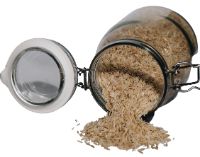
Ducks can definitely eat uncooked rice. Uncooked is easy for them to eat and doesn’t require much effort to swallow while providing a good amount of nutrients. However, it is important to clean and rinse the uncooked rice before offering it to the ducks. Uncooked rice is covered in dirt, starch, and sometimes bugs. It is important to remove much of the starch before serving. Starch binds water, and digesting the rice may be hard for the ducks. Uncooked rice is quite high in calories so, make sure to serve in moderation.
Can ducks eat cooked rice?
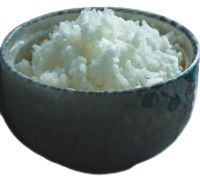
Ducks can eat cooked rice, and they like it. From my experience, ducks seem to like basmati rice the most since it’s easier for them to swallow. Rice is high in calories, so it’s important to serve in moderation. Cooked rice can stick together, especially if you are using jasmine rice. Try to feed the ducks in smaller pieces and preferably in a bucket of water so it will be easier for them to swallow.
Ducks eat herbs in their natural diet. If you want to grow herbs in your garden you need to know if there is a herb that may be harmful or toxic to the ducks. I wrote a resource helping you to chose what herbs you can have in your garden to feed your ducks with.
Can ducks eat brown rice?
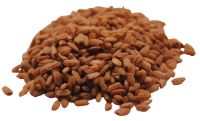
Ducks can eat brown rice and benefit from it. Brown rice is the whole grain and not only the inside part as the white rice is. Brown rice has more Magnesium and fiber than white rice and is good for ducks. However, you will still need to portion control and serve in moderation. Brown rice is 370 calories per 100g.
Can ducks eat moldy rice?

You should never feed a duck any moldy food. Besides mold, rice also rots and develops fungi. Both are lethal to ducks. If you have moldy food, throw it out or put it in the compost if it’s vegetable-based. You will notice rotten rice of the change of color. Rotten rice turns into an orange hue on top of the rice. Molded rice looks a bit like black pepper seeds.
Ducks are omnivores which means they eat both animals and vegetable sources of food. You may be interested in what other animals the ducks can and can not eat. I wrote a resource going through over 70 examples.
The rice and birds myth

There has been a myth going around for a long which states you shouldn’t offer uncooked rice to birds. The reason behind this is that the grains will swell inside the belly to that extent it would explode the stomach of the birds. This urban legend is most popular during weddings, where in some religions, the bride and groom have rice tossed at them, and the birds eating it up. However, this myth has been debunked and there isn’t any truth to it.
How often can I give rice to ducks?
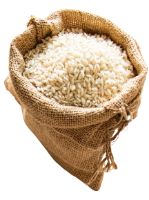
Rice can be a staple food for ducks, and in my opinion, be fed daily to them. Rice contains many good nutrients, which all serve a good purpose in the duck’s health. However, it would be best if you served them in moderation. Otherwise, the calories easily run away.
How much rice can I give to ducks?
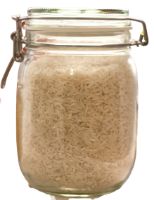
Adult ducks generally need a bit more than 1000 calories per day. 100g of rice is roughly 350 calories. Since the ducks should eat other things than rice, I try to give them 10g of uncooked rice each per day. I mix the rice with their regular pellets and aim for a protein intake between 16g and 20g a day.
Ducks enjoy nuts and fodders. If you have some extra nuts and want to share with the ducks you will need to know what nuts ducks and can not eat.
Safe ways to feed rice to ducks
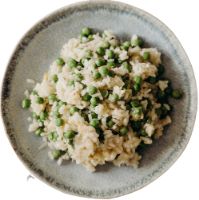
There are different safe ways you can feed rice to your ducks. There are also some ways you shouldn’t offer the ducks rice. Below, I will go through my best safe methods of feeding rice to my ducks.
1. Mix with pellets
This is very easy. The only thing you will need to do is to clean the uncooked rice until the water is clear. Then add it to the pellet mix. Don’t add the rice to your entire bag of pellets since it’s wet and will moisten all pellets. Add the rice to the pellets you are to feed that day. I usually go for Purina pellets.
2. Rice balls in water
This method seems to detain the ducks the longest. Cook the rice and add a little bit of extra water, so the grains become stickier. Cook 10g per duck you have. When you see the rice is more glutinous, you can start by making your balls. The rice is pretty hot, so I form the balls with two spoons and letting them cool. When the balls have cooled down, I put the rice balls in a bucket of water. The ducks will have a good time trying to eat the balls.
3. Mix the rice with vegetables
Also, a straightforward method. You can either serve the rice with raw vegetables or add the vegetables inside rice balls. However, it’s important you cook or cut the vegetables into smaller pieces if they are big and hard. Too big vegetables may suffocate the duck, and uncooked can be too hard for them. You might want to check out what vegetables you can and can’t feed to ducks here.
4. Never feed rice cakes to ducks
You should never feed rice cakes to ducks. Rice cakes may be a healthy food for humans, but they can be a nightmare for the ducks. Rice cakes contain a lot of salt, which may dehydrate them. The stiffness of rice cakes is a great choking hazard as well. It would be best if you avoided feeding the rice cakes to your ducks.
5. The size of the balls is important
If you are making rice balls or serving your ducks some sushi, you must be aware of the size of the rice balls. Ducks don’t chew their food and swallow the food whole you present to them. If the duck would try to eat a too big rice ball, the risk of them suffocating is higher. Smaller balls served in water are key.
6. Don’t season the rice
There is no reason for you to add spices to the rice. Ducks appreciate the rice plain. Spices usually contain salt. Salt may dehydrate the ducks and may cause kidney problems. Stronger spices like chili don’t bother ducks and other birds since they have no receptors for strong food. Seasoning would be a waste.
Health benefits from feeding rice to ducks?
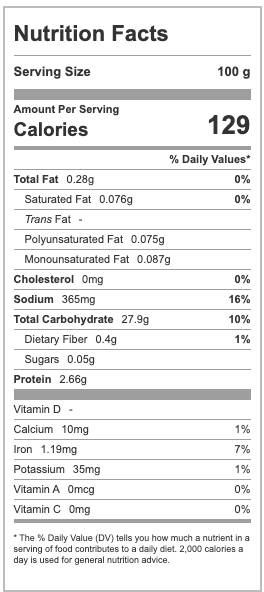
Calcium, Folate, Iron, Magnesium, Phosphorus, Potassium, Vitamin B6, and Zinc are some of the vitamins and minerals found in rice. The percentages in the picture are recommended daily intake for humans and not ducks.
Calcium in rice for ducks
Calcium is an essential mineral in a duck’s diet. Calcium helps to build and maintain strong bones in the body. Ducks require Calcium more than other birds since they walk and swim more.
Folate (Vitamin B9) in rice for ducks
Folate is important for cell growth and the formation of new blood cells.
Iron in rice for ducks
Iron is important for the growth and development of the body. The body uses iron to create hemoglobin to carry oxygen from the lungs to other parts of the body.
Magnesium in rice for ducks
Magnesium helps with supporting muscle and nerve function and energy production.
Phosphorus in rice for ducks
Phosphorus works with Calcium to ensure the bones are strong and healthy. It removes waste of repairs damaged body tissue.
Potassium in rice for ducks
Potassium helps to lower blood pressure and water retention. It helps the heartbeat stay regular and helps provide cells with nutrition, and removes waste from cells.
Vitamin B6 in rice for ducks
Vitamin B6 is used to turn food into energy inside the body. It also helps with cell functions but also creating serotonin and dopamine.
Zinc in rice for ducks
Zinc helps to develop and maintain a strong immune system.
Conclusion
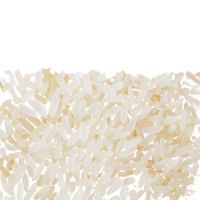
You can feed rice to ducks. Ducks can eat all types of rice. Basmati rice, jasmine rice, sushi rice, or any other type of rice.
Ducks love the taste of rice and are used in China to remove rice plants.
Both ducks and ducklings can eat rice. However, ducklings should eat protein-dense food in their early stage of life and later mix it up with different types of foods.
It would be a good idea to incorporate rice into your duck’s diet.
Rice is good for ducks since it comes packed with a lot of vitamins, minerals and keeping the duck full at the same time.
Ducks can eat both cooked and uncooked rice. The ducks in my backyard prefer uncooked basmati rice.
It would be best if you never fed molded rice or rice that has rotten to ducks. Mold is toxic and rotten food will harm your duck.
There is no particular amount you should aim for when feeding your ducks. The ducks must get plenty of calories and a lot of micronutrients. Beyond the pellets, I serve my ducks’ different types of foods. Among them, I feed the ducks 10g of uncooked rice each per day.
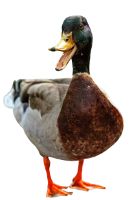
You can feed ducks safely by using these three ways:
- Mix the rice with the regular pellets
- Make rice balls and put them into water
- Mix the rice with vegetables
Avoid using these ways:
- Never feed rice cakes to ducks
- Ensure the food isn’t too big
- Don’t use any spices or seasoning
